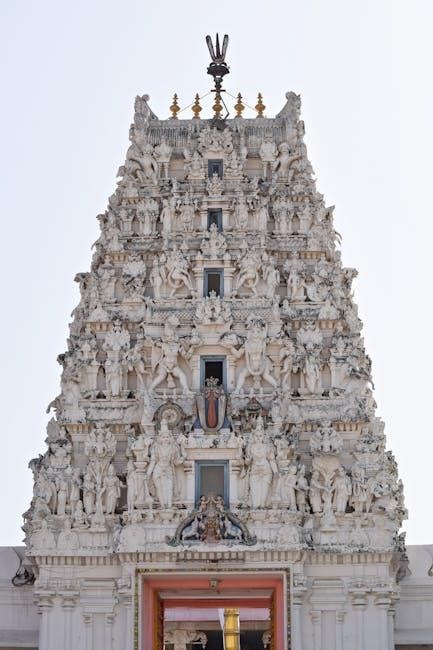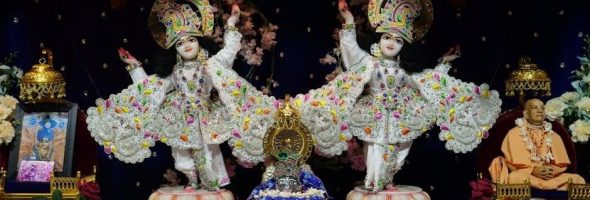Sri Vishnu Ashtothram, or Sri Vishnu Ashtottara Shatanamavali, is a sacred Hindu devotional text comprising 108 names of Lord Vishnu, emphasizing His divine qualities and protective nature․
What is Vishnu Ashtothram?
Vishnu Ashtothram, also known as Sri Vishnu Ashtottara Shatanamavali, is a revered devotional text in Hinduism․ It consists of 108 sacred names of Lord Vishnu, each highlighting His divine attributes, powers, and divine forms․ These names are chanted to express devotion, seek blessings, and attain spiritual growth․ The Ashtothram is widely recited in various Indian languages, including Telugu, and is often accompanied by sacred scripts like Sanskrit․ It is believed that chanting these names brings peace, prosperity, and spiritual upliftment, while also helping to overcome life’s challenges․ The text is deeply rooted in Vedic traditions and is considered a powerful tool for connecting with the divine essence of Lord Vishnu․ Its simplicity and profound meaning make it accessible to devotees of all ages and backgrounds․
Historical Background of Vishnu Ashtothram
Vishnu Ashtothram, an ancient Hindu devotional text, traces its roots to Vedic traditions and scriptures․ It is believed to have originated from the sacred chants and hymns dedicated to Lord Vishnu, a central deity in Hinduism․ The text, comprising 108 names, reflects the divine attributes and roles of Vishnu as the protector and preserver of the universe․ Over centuries, it has been recited in various languages, including Telugu, to maintain its accessibility and cultural relevance․ Its historical significance lies in its connection to Vedic rituals and its use in spiritual practices to invoke divine blessings․ The adaptation of Vishnu Ashtothram into Telugu has further enhanced its reach, making it a cherished part of devotional practices in South India․ Its enduring presence underscores its deep-rooted cultural and spiritual importance․
Cultural Significance of Vishnu Ashtothram
Vishnu Ashtothram holds profound cultural significance as a revered devotional text in Hindu tradition, particularly in South India․ Its recitation is integral to daily rituals, pujas, and spiritual practices, fostering a deep sense of devotion and community․ The Telugu version, available in PDF formats, has made it accessible to a broader audience, ensuring its cultural preservation․ It serves as a bridge between the divine and the devotee, embodying the spiritual and cultural values of the region․ The chanting of Vishnu Ashtothram is believed to bring harmony, prosperity, and divine blessings, strengthening faith and unity among worshippers․ Its enduring popularity reflects its role in preserving heritage and fostering a shared identity among devotees․

Structure of Vishnu Ashtothram
Vishnu Ashtothram consists of 108 sacred names of Lord Vishnu, each highlighting His divine attributes and virtues, structured rhythmically for easy recitation and memorization in Telugu․
108 Names of Lord Vishnu
The 108 names of Lord Vishnu, as detailed in the Sri Vishnu Ashtottara Shatanamavali, are revered for their profound spiritual significance․ Each name embodies a unique attribute or divine quality of Lord Vishnu, such as His role as the protector of the universe, His divine forms, and His benevolent nature․ These names are not merely descriptors but are considered powerful mantras that invoke blessings, peace, and spiritual growth when chanted with devotion․ The structure of these names is rhythmic and poetic, making them easy to recite and remember․ In Telugu, these names are often presented in a scripted format, accompanied by transliterations to facilitate recitation by devotees worldwide․ Chanting these 108 names is believed to bring harmony, prosperity, and divine grace into one’s life, making it a cherished practice among devotees․
Language and Script
The Sri Vishnu Ashtothram is traditionally recited in Sanskrit, but its widespread popularity has led to translations in various languages, including Telugu․ The Telugu version is particularly cherished for its melodic cadence and cultural significance․ The text is typically written in the Telugu script, which is a derivative of the Brahmic script, and is known for its elegance and readability․ For devotees who may not be fluent in Telugu, transliterated versions in English or other scripts are also available, ensuring accessibility․ The language and script used in the Vishnu Ashtothram are deeply revered, as they preserve the spiritual essence and phonetic precision of the original Sanskrit mantras․ PDF versions of the Telugu script are widely sought after for easy reference and recitation․
Chanting and Recitation Guidelines
Chanting the Sri Vishnu Ashtothram is a revered practice that requires focus and devotion․ Devotees are advised to recite the 108 names with clarity and concentration, ideally in a calm and pure environment․ The recitation can be performed during daily rituals, pujas, or special occasions like Ekadashi․ Chanting with a steady rhythm and correct pronunciation is emphasized to preserve the spiritual potency of the mantras․ Many devotees prefer chanting along with the Telugu PDF version, as it provides clear pronunciation guides and enhances accessibility․ Regular recitation is believed to bring peace, happiness, and spiritual upliftment, while also helping to overcome life’s challenges and attract divine blessings․ Consistency in practice is highly recommended for maximum benefits․

Benefits of Chanting Vishnu Ashtothram
Chanting Vishnu Ashtothram brings peace, happiness, and spiritual growth․ It helps remove obstacles, attracts divine blessings, and fosters a deeper connection with Lord Vishnu, ensuring prosperity and harmony in life․
Spiritual Upliftment
Chanting Vishnu Ashtothram is a powerful means of achieving spiritual upliftment․ It helps devotees connect with Lord Vishnu, fostering a sense of divine presence and inner peace․ By reciting the 108 names, one’s mind and soul are purified, leading to heightened consciousness and spiritual growth․ The rhythmic recitation creates a meditative focus, allowing individuals to transcend worldly concerns and experience divine bliss․ Regular chanting strengthens devotion, enhances mental clarity, and promotes self-realization․ The spiritual energy emitted during the recitation nourishes the heart and soul, fostering a deeper connection with the Almighty․ This sacred practice is a pathway to spiritual enlightenment, empowering believers to embrace a more meaningful and purposeful life․ The availability of Vishnu Ashtothram in Telugu PDF further facilitates accessibility, enabling widespread spiritual transformation․
Removal of Obstacles
Chanting Vishnu Ashtothram is believed to effectively remove obstacles in life, bringing harmony and prosperity․ The 108 names of Lord Vishnu embody His divine powers, which are invoked to dispel negativity and challenges․ Devotees trust that reciting these names with faith attracts divine intervention, resolving difficulties and restoring balance․ The spiritual energy from the chants is thought to purify the environment and shield against adverse influences․ Many followers rely on Vishnu Ashtothram during troubled times, seeking solace and solutions․ Regular recitation strengthens one’s ability to overcome life’s hurdles, fostering resilience and optimism․ The Telugu PDF versions of Vishnu Ashtothram make this practice accessible, ensuring that devotees can seek divine assistance whenever needed, reinforcing their faith and trust in Lord Vishnu’s protective grace․
Attracting Divine Blessings
Chanting Vishnu Ashtothram is a powerful way to attract divine blessings from Lord Vishnu․ The 108 names encapsulate His divine attributes, invoking His grace and mercy․ Devotees believe that reciting these names with sincerity and devotion fosters a deep connection with the Lord, leading to spiritual and material prosperity․ The chants are said to bring peace, happiness, and good fortune, aligning one’s life with divine will․ Many followers use the Telugu PDF versions of Vishnu Ashtothram to recite the names conveniently, seeking blessings for health, wealth, and spiritual growth․ Regular chanting is believed to strengthen one’s faith and draw divine favor, ensuring a life filled with harmony and bliss under Lord Vishnu’s protective grace․

Vishnu Ashtothram in Telugu
Sri Vishnu Ashtothram in Telugu offers devotees the 108 sacred names of Lord Vishnu, available as downloadable PDFs, fostering devotion and cultural connection through its revered lyrics․
Lyrics and Transliteration
The lyrics of Vishnu Ashtothram in Telugu are a divine collection of 108 sacred names of Lord Vishnu, each encapsulating His divine attributes and blessings․ These lyrics, written in the Telugu script, are widely revered for their spiritual significance and poetic beauty․ For devotees who may not be fluent in Telugu, transliterated versions are readily available, making it easier to chant and understand the prayers․ The lyrics are often accompanied by meanings or explanations, enhancing the devotee’s ability to connect deeply with the hymns․ Digital platforms and PDF downloads have made these lyrics more accessible, ensuring that worshippers worldwide can recite them with devotion․ The transliteration also helps in maintaining the authenticity of the pronunciation, preserving the cultural and devotional essence of the text․
PDF Availability and Download
Vishnu Ashtothram in Telugu is widely available in PDF format for easy download, making it accessible to devotees worldwide․ These PDFs typically include the complete lyrics in Telugu script, along with transliterations and translations in English for better understanding․ Many spiritual and devotional websites offer free downloads of Vishnu Ashtothram, allowing users to conveniently access the text for daily chanting or special rituals․ Additionally, platforms like Vaidika Vignanam and Stotranidhi provide high-quality, downloadable versions of the Ashtothram, ensuring that the sacred hymns reach a global audience․ This digital accessibility has made it easier for followers to incorporate Vishnu Ashtothram into their spiritual practices, fostering devotion and connection with the divine․

Importance of Telugu Language in Devotion
Telugu, one of the oldest Dravidian languages, holds significant cultural and spiritual value in Hindu devotion․ The Vishnu Ashtothram in Telugu is deeply revered, as it connects devotees to their linguistic and spiritual heritage․ The Telugu script is considered sacred, and chanting in this language is believed to enhance the devotional experience․ Many devotees prefer the Telugu version for its melodic and rhythmic appeal, which aids in meditation and focus․ The availability of Vishnu Ashtothram in Telugu PDF formats has further popularized its use, making it accessible to a wide audience․ This language serves as a bridge between tradition and modernity, preserving ancient spiritual practices while adapting to contemporary needs․

How to Use Vishnu Ashtothram for Worship
Chanting Vishnu Ashtothram daily, incorporating it into rituals, and using Telugu PDFs enhances worship by providing easy access, fostering spiritual focus, and strengthening divine connection․
Daily Chanting Practices
Daily chanting of Vishnu Ashtothram is a powerful practice for spiritual growth․ Devotees are encouraged to recite the 108 names of Lord Vishnu with dedication and focus․ Early morning is considered the most auspicious time for chanting, as it helps in seeking divine blessings and starting the day positively․ One can use the Telugu PDF version for easy access and accurate pronunciation․ Regular chanting fosters inner peace, removes obstacles, and strengthens the connection with the divine․ It is advisable to chant in a calm environment, preferably after taking a bath and wearing clean clothes, to maintain purity and concentration during the practice․ Consistency in daily chanting ensures maximum spiritual benefits and emotional well-being․
Rituals and Pujas
Vishnu Ashtothram is an integral part of various rituals and pujas dedicated to Lord Vishnu․ During these ceremonies, devotees often recite the 108 names to invoke divine blessings and seek protection․ The Telugu PDF version of Vishnu Ashtothram is widely used in pujas, as it provides an accessible and precise format for chanting․ Rituals typically involve offering flowers, lighting lamps, and performing aarti while reciting the names․ Priests or devotees may lead the chanting, ensuring the correct pronunciation and rhythm․ This practice is believed to purify the environment, bring harmony, and fulfill heartfelt prayers․ Incorporating Vishnu Ashtothram in pujas strengthens the spiritual connection and fosters a sense of community among participants․
Meditation and Focus
Meditation and focus are essential when chanting Vishnu Ashtothram, as they help connect the mind and soul to Lord Vishnu’s divine energy․ The 108 names, when recited with concentration, foster mental clarity and inner peace․ Devotees often use the Telugu PDF version of Vishnu Ashtothram for guided meditation, as it provides a structured format for chanting․ The practice involves focusing on the meaning of each name, visualizing Lord Vishnu’s divine form, and surrendering to His grace․ Regular meditation on these names is believed to enhance spiritual growth, calm the mind, and strengthen devotion․ It is recommended to chant during early morning hours, preferably after purification rituals, to maximize the benefits of this sacred practice and deepen one’s connection with the divine․

Related Spiritual Texts
Vishnu Ashtothram is complemented by texts like Vishnu Sahasranama, Bhagavad Gita, and other Ashtothrams and Stotras, enriching devotion and deepening spiritual understanding through sacred chants and teachings․
Vishnu Sahasranama
Vishnu Sahasranama is a revered Hindu scripture from the Mahabharata, where Bhishma Pitamaha extols Lord Vishnu’s 1000 divine names to Yudhishthira․ This sacred text, like Vishnu Ashtothram, glorifies Vishnu’s attributes, emphasizing His divine qualities as the protector and sustainer of the universe․ While Vishnu Ashtothram contains 108 names, Vishnu Sahasranama provides a more expansive exploration of His divine nature․ Both texts are integral to devotion, fostering spiritual growth and a deeper connection with Lord Vishnu․ The availability of Vishnu Sahasranama in Telugu, alongside Vishnu Ashtothram, allows devotees to access these sacred chants in their preferred language, enhancing their spiritual practice and devotion․
Bhagavad Gita
The Bhagavad Gita is a cornerstone of Hindu philosophy, embedded within the Mahabharata․ It presents dialogues between Prince Arjuna and Lord Krishna, an incarnation of Vishnu, discussing the essence of duty, love, and selfless action․ This sacred text emphasizes the importance of devotion and surrender to the divine, aligning with the spiritual intent behind chanting Vishnu Ashtothram․ The Gita encourages seekers to embrace their responsibilities while cultivating a deep connection with the divine, mirroring the transformative power of reciting Vishnu’s names․ Its teachings complement the devotional practices associated with Vishnu Ashtothram, offering a profound path to spiritual growth and divine alignment․
Other Ashtothrams and Stotras
Beyond Vishnu Ashtothram, there are numerous other devotional texts that complement its spiritual essence․ These include Lakshmi Ashtothram, Ganesh Ashtothram, and Shiva Ashtothram, each dedicated to different deities but sharing similar devotional intent․ Stotras like Lalitha Sahasranama and Hanuman Chalisa also hold significant importance, offering devotion to various aspects of the divine․ These texts, often recited alongside Vishnu Ashtothram, enrich spiritual practices by providing diverse ways to connect with the divine․ They emphasize the universal themes of devotion, surrender, and the pursuit of divine grace, making them integral to Hindu worship and meditation․ These scriptures, including Vishnu Ashtothram, collectively guide devotees toward spiritual growth and a deeper understanding of the divine․

The Role of Devotion in Vishnu Ashtothram

Devotion in Vishnu Ashtothram is a heartfelt expression of love and surrender to Lord Vishnu, fostering spiritual harmony and divine connection, essential for inner peace and guidance․
Expressing Devotion
Expressing devotion through Vishnu Ashtothram involves chanting the 108 sacred names of Lord Vishnu with deep reverence and surrender․ This practice fosters a profound spiritual connection, allowing devotees to express their love, gratitude, and faith․ By reciting these names, individuals seek to honor Vishnu’s divine qualities and protective grace․ The act of chanting becomes a heartfelt offering, transcending mere words to convey inner emotions and devotion․ In Telugu, the lyrical and rhythmic nature of the Ashtothram enhances the devotional experience, making it a powerful medium for expressing surrender and seeking divine blessings․ Regular recitation strengthens faith, brings inner peace, and deepens the bond between the devotee and the divine․ It is a timeless way to celebrate Lord Vishnu’s eternal presence in daily life․
Seeking Guidance
Chanting Vishnu Ashtothram is a powerful way to seek divine guidance and solace․ Devotees often recite these 108 names to find direction in life, overcome challenges, and attain inner peace․ The sacred names of Lord Vishnu embody His protective and nurturing qualities, offering comfort and reassurance․ By surrendering fears and doubts through this chant, believers seek His wisdom and grace․ The Telugu version of Vishnu Ashtothram is particularly cherished for its melodic and devotional appeal, making it easier to connect with the divine․ Regular recitation is believed to grant clarity, strength, and the ability to navigate life’s complexities with faith․ It serves as a spiritual anchor, reminding devotees of Lord Vishnu’s eternal presence and guidance in their lives․
Building a Connection with the Divine
Chanting Vishnu Ashtothram is a profound way to build a connection with the divine, fostering a deep sense of spiritual unity․ The 108 names of Lord Vishnu serve as a bridge to His eternal grace, allowing devotees to experience His presence in their lives․ By reciting these sacred names, individuals can transcend worldly distractions and focus on the divine essence․ The Telugu version of Vishnu Ashtothram is particularly revered for its melodious and devotional appeal, making it easier to immerse oneself in meditation and contemplation․ This practice not only strengthens faith but also cultivates a sense of oneness with the divine, helping devotees feel closer to Lord Vishnu and His guiding light․ It is a timeless tool for nurturing spirituality and deepening the bond with the Almighty․

Modern Relevance of Vishnu Ashtothram
Vishnu Ashtothram remains highly relevant in contemporary times through its digital availability and global accessibility, ensuring its timeless spiritual impact endures across modern societies and diverse cultures․
Adaptation in Contemporary Times
Vishnu Ashtothram has seamlessly adapted to modern times through digital platforms, making it accessible to a global audience․ PDF versions and mobile apps now offer convenient access to its lyrics and transliterations in Telugu, ensuring its reach extends beyond traditional boundaries․ Online platforms and social media have further amplified its presence, allowing devotees worldwide to chant and reflect on its spiritual significance․ This adaptation not only preserves the text’s cultural importance but also introduces it to younger generations, blending ancient traditions with contemporary technology․ As a result, Vishnu Ashtothram remains a vibrant and relevant devotional practice in today’s fast-paced world, fostering spiritual connections and cultural continuity․
Digital Availability and Accessibility
Vishnu Ashtothram in Telugu is widely available in digital formats, making it easily accessible to devotees worldwide․ PDF versions of the text can be downloaded from various spiritual and devotional websites, ensuring that the 108 names of Lord Vishnu are just a click away․ This digital accessibility has revolutionized the way people engage with the text, allowing for easy sharing, printing, and reference․ Many platforms also offer transliterations and translations, catering to both Telugu-speaking audiences and those who wish to learn the chants․ The rise of mobile apps and online repositories has further enhanced accessibility, enabling devotees to chant and reflect on the spiritual significance of Vishnu Ashtothram anytime, anywhere․ This digital presence ensures the text remains relevant and accessible to modern devotees, fostering spiritual connection and convenience․
Global Reach and Popularity
Vishnu Ashtothram has gained immense popularity worldwide, transcending cultural and linguistic boundaries․ The availability of its Telugu PDF version online has significantly contributed to its global reach, allowing devotees from diverse regions to access and chant the 108 names of Lord Vishnu․ This widespread dissemination has fostered a sense of unity among followers, regardless of their geographical location․ The text’s spiritual significance and the ease of digital access have made it a cherished devotional resource for millions․ Its global popularity is evident in its incorporation into various spiritual practices, rituals, and daily worship routines across the world, highlighting its enduring appeal and universal relevance in modern times․
Vishnu Ashtothram in Telugu PDF remains a timeless devotional resource, offering spiritual upliftment and divine blessings․ Its global accessibility ensures enduring relevance, fostering faith and devotion worldwide․
Final Thoughts on Vishnu Ashtothram
Vishnu Ashtothram in Telugu PDF is a powerful devotional tool, offering spiritual growth and divine connection․ Its 108 names of Lord Vishnu encapsulate His divine attributes, fostering devotion and peace․ Regular chanting is believed to bring prosperity, remove obstacles, and attract blessings․ The availability of Telugu lyrics and PDF formats has made it accessible to millions, ensuring its global reach․ This sacred text remains a cornerstone of Hindu spirituality, guiding devotees toward a deeper understanding of Lord Vishnu’s grace․ Embracing Vishnu Ashtothram enriches one’s faith and strengthens the bond with the divine, making it a timeless and enduring spiritual practice for generations․
Encouragement for Regular Practice
Regular chanting of Vishnu Ashtothram in Telugu fosters spiritual growth and brings peace, happiness, and divine blessings․ By incorporating this practice into daily life, devotees can seek guidance, remove obstacles, and strengthen their connection with Lord Vishnu․ The availability of Telugu lyrics and PDF formats makes it accessible for everyone to chant with devotion․ Embracing this sacred text regularly helps cultivate a deeper sense of faith and tranquility, aligning one’s life with divine grace․ It is a timeless practice that nurtures the soul and inspires a meaningful journey toward spiritual enlightenment and inner harmony, ensuring its relevance for generations to come․
The Enduring Legacy of Vishnu Ashtothram
Vishnu Ashtothram’s enduring legacy lies in its timeless spiritual significance and universal appeal․ For centuries, this sacred text has been a cornerstone of devotion, guiding followers in their quest for peace and divine connection․ Its 108 names of Lord Vishnu encapsulate His divine attributes, offering solace and inspiration across generations․ The availability of Telugu lyrics and PDF versions ensures its accessibility in the modern era, preserving its cultural and religious heritage․ As a testament to its lasting impact, Vishnu Ashtothram remains a cherished practice, fostering spiritual growth and strengthening faith․ Its influence continues to resonate globally, making it a vital part of Hindu devotion and a bridge between tradition and contemporary spirituality, ensuring its relevance for future generations․

